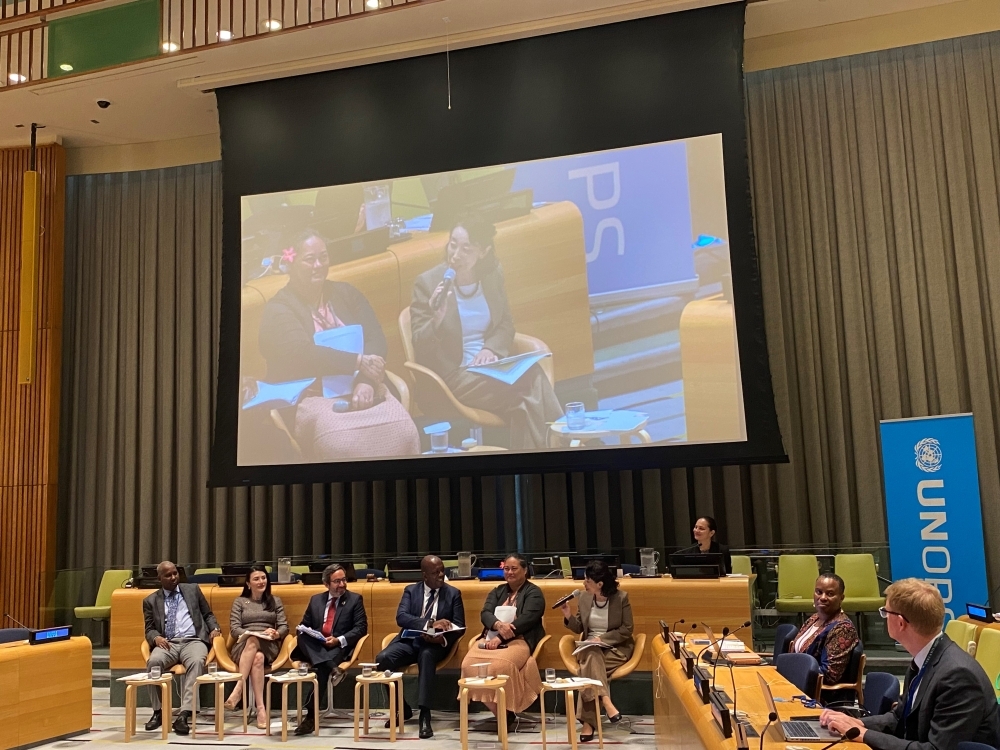Remarks by H.E. Ambassador Mitsuko SHINO, Deputy Permanent Representative of Japan to the United Nations, Executive Board Second Regular Session 2023, Interactive Dialogue Infrastructure for Energy: Pathways towards a just, green and resilient transition
2023/8/29

Thank you for inviting me to this interactive dialogue.
Today, there are two aspects to the energy problems facing the international community. The first aspect is the issue environmental impacts. While fossil fuels seem like an attractive energy source for countries aiming for rapid development because of their superior economic efficiency, their negative impacts on the environment and climate are ultimately very costly.
The second aspect is the uneven distribution of energy resources, particularly of fossil fuels. Shocks arising from resource-rich countries can destabilize the supply of energy on a global scale, as evidenced by past conflicts in the Middle East and the current Russian invasion of Ukraine.
To meet these challenges, Japan proposes the use of hydrogen- and ammonia-based energy technologies, which may be able to satisfy the needs for energy security, economic efficiency, and low environmental impact.
Under the leadership of Prime Minister Kishida, Japan is strengthening its government-wide efforts to achieve decarbonization through renewable energy and hydrogen technologies.
On renewable energy, related ministries and agencies are working together to promote the expansion of renewable energy while working in harmony with local communities.
With respect to hydrogen, Japan formulated its first “Basic Hydrogen Strategy” in 2017 ahead of the rest of the world. Through the Strategy, Japan is accelerating construction of an international hydrogen supply chain and establishment of bases in collaboration with Australia and countries in the Middle East and Asia.
Japan is also promoting the development of decarbonized thermal power generation technologies utilizing hydrogen and ammonia.
Carbon dioxide Capture and Storage (CCS) and Carbon dioxide Capture, Utilization and Storage (CCUS) are also important initiatives where Japan has been promoting international collaboration. For instance, as CCUS is an essential technology for achieving carbon neutrality, and since each ASEAN country has over 10 billion tons of CO2 storage capacity, Japan has launched the "Asia CCUS Network" with 10 ASEAN countries, the US, and Australia.
In promoting sustainable and effective decarbonization, balancing stable energy supply with decarbonization is a major challenge. In light of economic growth in emerging economies, increasing energy demand, seasonal fluctuations, and differences in potential by region, it is essential to present various and realistic pathways to energy transitions, suited to each country's situation.
Demand for clean energy manufacturing and for critical minerals are also expected to increase. Therefore, there is a current global challenge to strengthen supply chains for these. Without resilient supply chains, energy transitions will be delayed and more expensive, which could hamper countries' sustainable development plans. At the Hiroshima G7 Summit, Japan committed to establishing new partnerships with low- and middle-income countries (LMICs), which play a key role in building these supply chains, to diversify and establish resilient supply chains. The G7 further committed to leverage initiatives such as the Global Partnership for Infrastructure Investment (PGII), which aims to fill in infrastructure investment gaps in partner countries by mobilizing public and private funds.
Finally, turning toward the UN, at the Security Council Open Debate in June, Mr. Jean-Pierre Lacroix, UN Under-Secretary-General for Peace Operations, reported in his briefing that the UN is promoting renewable energy deployment based on the Environment Strategy for Peace Operations, which is helping to reduce the UN’s environmental footprint while at the same time promoting access to clean energy in host countries. We understand that UNDP is working to promote sustainable economic transformations, including decarbonization, in developing countries and countries vulnerable to climate change risks, as well as climate change adaptation measures. We hope that UNOPS, in cooperation with relevant UN agencies, conducts tailor-made studies in accordance with each country’s situation.
